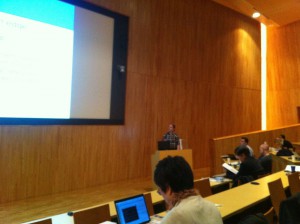I attended the 5th international symposium on Languages in Biology and Medicine (LBM 2013), held at Tokyo University. There, I presented the paper “Vocabulary Expansion by Semantic Extraction of Medical Terms” by Maria Skeppstedt, Magnus Ahltorp and Aron Henriksson. The paper was a result of the work conducted during my internship at the Language Media Lab at Hokkaido University, but with important additional contributions from Magnus and Aron. The paper was about automatic extraction of terms for expressing Medical Findings and Pharmaceutical Drugs from the Swedish journal Läkartidningen. The slides for the presentation can be found here.
There were many presentations related to the research conducted by our Clinical Text Mining Group at DSV. Sampo Pyysalo presented a paper (“Distributional Semantics Resources for Biomedical Text Processing”) in which the performance of a named entity recogniser was enhanced using features in form of clustered vectors from a word space constructed by the neural networks-based word2vec package. The study also made use of a word space constructed with Martin Duneld’s random indexing package. Sampo also gave a high-light talk of another study (which later will be published in BMC Bioinformatics) in which named entity recognition of mentions of anatomical structures was enhanced by features based on cluster membership in clusters constructed through Brown’s clustering. Mizuki Morita presented a comparison between influenza monitoring through Google search terms and through an SVM classifier of Twitter searches, Alicia Pérez presented a rule- and key-word-based approach for Spanish ICD-9 coding and Juan Antonio Lossio Ventura presented key-word extraction using the C-value method. A study by Hyunju Lee on a gene search engine, showed the results of the searches by colour coding relevant entities in the retrieved journal abstracts. Kevin Cohen presented a study on how features from topic modelling can be used for improving assertion classification. There was also a keynote speech on the Japanese KEGG database, which contains pharmaceutical drug-related information.

The symposium was held in a very beautiful lecture hall at Tokyo University. Here Kai Hakala from Turku University, who was awarded best paper for “Hypothesis Generation in Large-Scale Event Networks”, presents.
